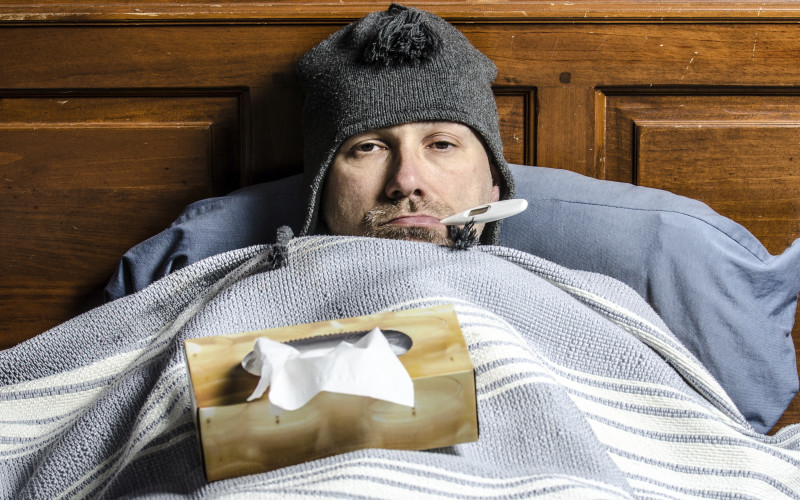What’s up with this crazy flu season?

Have you noticed that all of a sudden it seems like everybody you know is getting sick? As the infection prevention officer and hospital epidemiologist at Christiana Care Health System, I naturally get a lot of questions whenever the flu season takes an apparent turn for the worse. Here are some answers to the most common questions I’ve been getting lately.
Q: We haven’t heard that much about people getting the flu this year. Is that changing?
A: Yes. In the last few weeks we have seen a dramatic increase in flu cases, although numbers are still less than they were last year when we had a severe flu season.
Q: So why is flu season starting later this year?
A: We expect a flu epidemic every year, but the timing is always unpredictable. Why it came later than usual this year might be linked to the weather. It was warm, and people were out and about instead of being together in confined spaces. But we don’t know why for sure.
Q: Will a flu shot prevent me from getting the flu?
A: In general, flu shots are our single best way to prevent the flu. On average, the vaccine decreases the risk of flu illness by 50 to 65 percent. The vaccine’s effectiveness varies based on the person being vaccinated, but even those who still get the flu despite being vaccinated will not get as sick. This year’s flu vaccine is a good match to the strains that are circulating, unlike last year.
Q: So who needs a flu shot?
A: The Centers for Disease Control and Prevention recommends everyone over the age of 6 months be vaccinated. Anyone who works in health care, anyone who works in child care, anyone who is around young children, including parents and grandparents absolutely should have a flu shot. Young children under age 5, adults 65 and older, those with chronic medical conditions (like diabetes, heart and lung disease, and cancer) and pregnant women also should be vaccinated.
Q: I worry that the flu shot will make me sick. Is that possible?
A: Most people will tolerate the flu shot with no problem. The shot can’t give you the flu, so there’s no need to worry about that. Some people are a little sore for a day or two after they get a shot.
Q: How will I know if I am coming down with the flu?
A: Unlike a cold, which often builds up over several days, with the flu, you often go from feeling normal to feeling like you have been run over by a truck within a few hours. You’re feverish or have chills, a cough, muscle or body aches, headaches and severe fatigue. Other common cold symptoms, like nasal congestion, runny/stuffy nose, and sneezing, are uncommon with flu. Some people, more often children, can get vomiting and diarrhea.
Q: If I feel myself getting sick, what should I do?
A: If you are having severe symptoms, like trouble breathing or confusion, seek medical care right away. People who are at high risk for severe flu, such as pregnant women, those with chronic medical conditions, and the very young/very old should call their doctor, because treatment may be needed. Most people who are otherwise healthy can treat the flu on their own at home. Rest, drink lots of fluids and let your body fight the infection.
Q: If someone in my family gets the flu, how can I avoid getting it?
A: Wash your hands! Good hand hygiene is important. We touch our noses and our faces hundreds of times a day, and washing our hands is a good way to prevent illness. People who are ill should cover their coughs with a tissue and then throw the tissue away. If you have a high-risk condition, you may need to take antiviral medication to prevent getting the flu – contact your doctor.
There’s a little bit of an art to properly washing your hands to prevent infection. If you have a sick family member at home, you might want to review these handwashig tips from the Centers for Disease Control.
Q: What can we do to make someone who has the flu feel better?
A: Oseltamavir (Tamiflu®) and other prescription antiviral medications treat the flu and should be used for patients who are hospitalized for flu or are at high risk of severe flu. For others, these medicines will likely only shorten your symptoms for a day or two. Over-the-counter pain relievers can help with the discomfort.
Q: What are the most serious complications of the flu?
A: The most worrisome complication is pneumonia, which can be due to flu itself or a bacterial co-infection. Flu can worsen other chronic medical problems, such as asthma, diabetes, heart failure or COPD. Other complications are dehydration, sinus infections and ear infections, especially in children. There is some evidence that people are at increased risk of heart attacks and other non-infectious problems for some time after getting the flu. So preventing it in the first place is important.